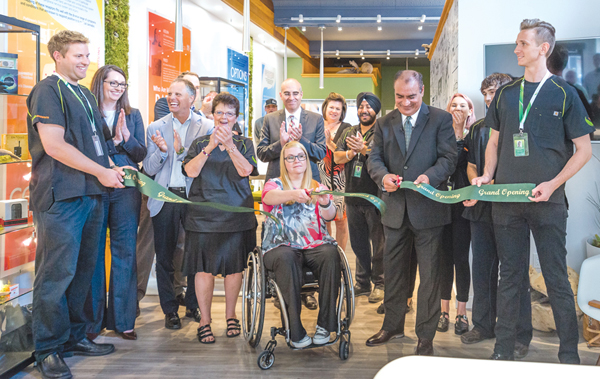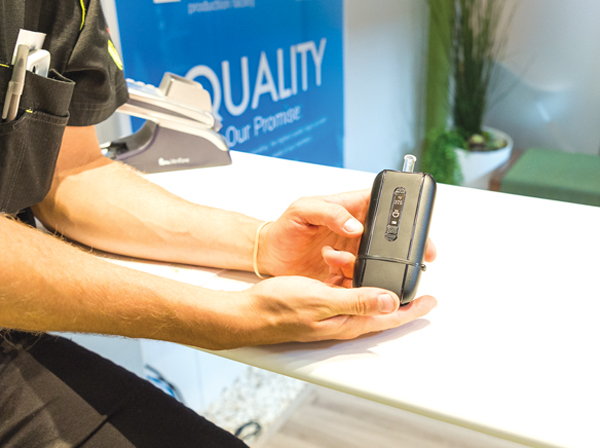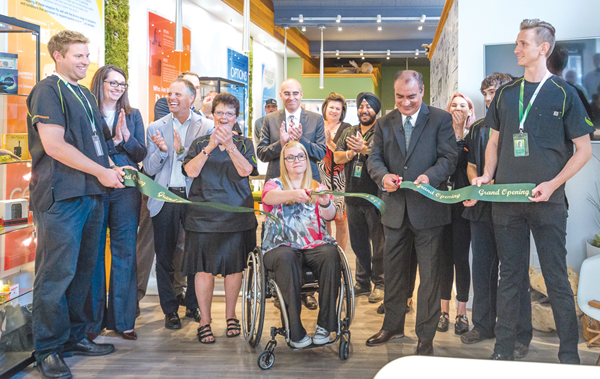Story and photos by Ted Simpson –
There’s been a striking new addition to the Wellington West streetscape, and it’s arrived in the form of a National Access Cannabis (NAC) office.
Under the large, eye-catching sign and through open bay windows is a modern office that facilitates the medical marijuana process for patients who choose cannabis as their method of treatment.

On June 29, NAC officially opened their doors on the company’s second location. The Hintonburg office joins the company’s initial location in Victoria, BC which opened in January.
NAC CEO Gulwant Bajwa, a cancer survivor who uses his own experience to relate to clients who are in pain, sums up what the company is all about: “It’s an education centre that is geared towards educating people on the safe and responsible use of cannabis as a medicine.”
It’s important to note that NAC does not store or dispense cannabis and is not a venue for marijuana use.
The company essentially functions as a middleman between the patient and the government medical marijuana program. For the average person to access the medical cannabis program, there is a daunting amount of administrative and legal hurdles. NAC membership takes care of the complex process and allows the patient to focus on a proper diagnosis and treatment.
To be considered for membership, a client needs supporting medical documents and a letter of diagnoses from a licensed physician. A practicing doctor must confirm the presence of an illness that can be treated with cannabis. These conditions range from cancer, to anxiety, to arthritis.
“NAC is in a position to help people deal with pain, that’s what I suffered – physical pain, mental pain,” says Bajwa. [story continues below photo]

NAC employee Brock Marcotte describes the clients they have already helped and expect to see in the future.
“These are people who are using traditional pharmaceuticals and are not happy with the effects and side effects. There are also people who have been self-medicating with cannabis who know it works for them, but they are having to get it from the black market.”
The key difference between black market pot and medical marijuana is that not all marijuana is the same, or even similar. Different strains of the plant have been developed to treat certain symptoms of illness. One of the key services of NAC is matching a patient with the particular strain of cannabis that will benefit their condition.
Marcotte also explains that NAC imposes strict guidelines on the cannabis suppliers they deal with, making sure members only receive product that is organically grown, with no additional chemicals and pesticides.
It’s a unique business for the area and NAC has been drawing the attention of just about everyone who passes by. On opening day, more than a few heads turned to take a longer look at the storefront.
Reaction from neighbours so far has been mixed. Uncle Bob, owner of Fab Gear 64 across the street, was on hand for the media launch to show his support for NAC. Alejandra Mathisen, owner of nearby Amanecer Fashion Boutique was mostly indifferent to the new addition.
“It doesn’t bother me at all,” she says.
Susie Pearson of The Extraordinary Baby Shoppe, was apprehensive of the business concept: “It does look nice, and there are already two head shops down the street anyway, so it’s better than that.”
Though several people have drawn the comparison to a traditional head shop, there are very few similarities. NAC doesn’t stock any of the bongs, pipes and papers found at Smoke Signalz, and carry only a small selection of vaporizers (similar to electronic cigarettes). NAC does not actually encourage smoking cannabis.
On the afternoon of July 3, a group of NAC staff spent some time on the sidewalk, interacting with the public and handing out information about the business. According to the canvassers, the response from people on the street has been mostly supportive. They estimate about 85 to 90 per cent of people have a positive reaction to the NAC concept.
